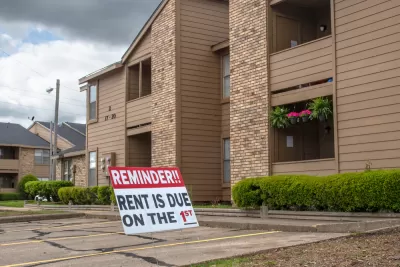Advocates have sounded alarms since the pandemic's outset about the potential for unprecedented waves of evictions as Americans deal with the economic consequences of the pandemic, but authoritative real-time data on the rental market is lacking.

Jenny Schuetz provides insight on how to scientifically and accurately predict the economic risk facing the U.S. rental market as the pandemic surpasses the seven month mark. Many households are "running on fumes," according to Schuetz, but one looming crisis, the threat of millions of evictions, has stayed in the background. Questions like "How many renters are in financial trouble?" and "How many will face eviction when current protections end?" are hard to answer, however, because there isn't a lot of real-time data for provide insight.
Policymakers and the public receive high-frequency updates on labor markets, including weekly unemployment insurance claims and monthly jobs numbers. But federal statistical agencies don’t publish real-time data on housing distress, especially for renters.
One resource of tremendous value during this time, according to Schuetz, has been the Household Pulse Survey, launched this year by the U.S. Census Bureau. New research is helping shed light on the usefulness of the data collected by the Household Pulse Survey.
"A new paper from Jeff Larrimore and Erin Troland sheds light on how responses from the Household Pulse Survey can be used to forecast how many households will miss rent payments—and a caution on how not to use the data," explains Schuetz. The key finding: comparing responses over time yields more accurate probabilities for rent payments.
Schuetz provides a lot more detail about the study's methodology, also comparing a few other studies that also attempt to wring actionable data from the survey, in an effort to gain a stronger understanding of the risk facing the U.S. rental market.
FULL STORY: How many households can’t pay next month’s rent? That’s a tricky question.

Maui's Vacation Rental Debate Turns Ugly
Verbal attacks, misinformation campaigns and fistfights plague a high-stakes debate to convert thousands of vacation rentals into long-term housing.

Planetizen Federal Action Tracker
A weekly monitor of how Trump’s orders and actions are impacting planners and planning in America.

San Francisco Suspends Traffic Calming Amidst Record Deaths
Citing “a challenging fiscal landscape,” the city will cease the program on the heels of 42 traffic deaths, including 24 pedestrians.

Adaptive Reuse Will Create Housing in a Suburban Texas Strip Mall
A developer is reimagining a strip mall property as a mixed-use complex with housing and retail.

Study: Anti-Homelessness Laws Don’t Work
Research shows that punitive measures that criminalized unhoused people don’t help reduce homelessness.

In U.S., Urban Gondolas Face Uphill Battle
Cities in Latin America and Europe have embraced aerial transitways — AKA gondolas — as sustainable, convenient urban transport, especially in tricky geographies. American cities have yet to catch up.
Urban Design for Planners 1: Software Tools
This six-course series explores essential urban design concepts using open source software and equips planners with the tools they need to participate fully in the urban design process.
Planning for Universal Design
Learn the tools for implementing Universal Design in planning regulations.
Heyer Gruel & Associates PA
JM Goldson LLC
Custer County Colorado
City of Camden Redevelopment Agency
City of Astoria
Transportation Research & Education Center (TREC) at Portland State University
Jefferson Parish Government
Camden Redevelopment Agency
City of Claremont




























